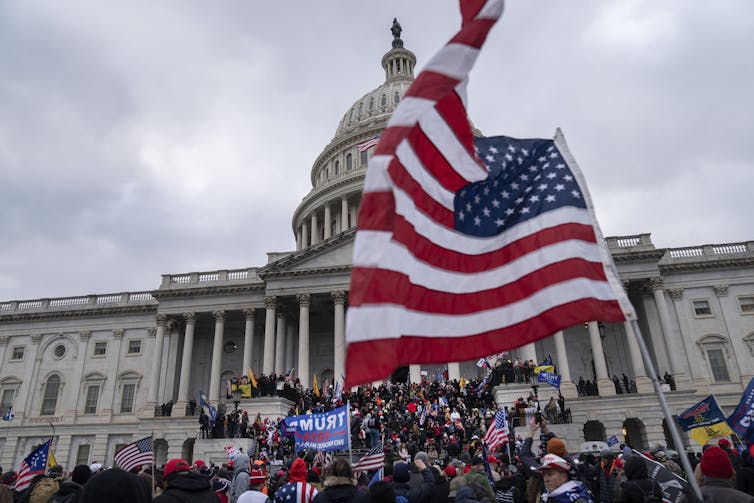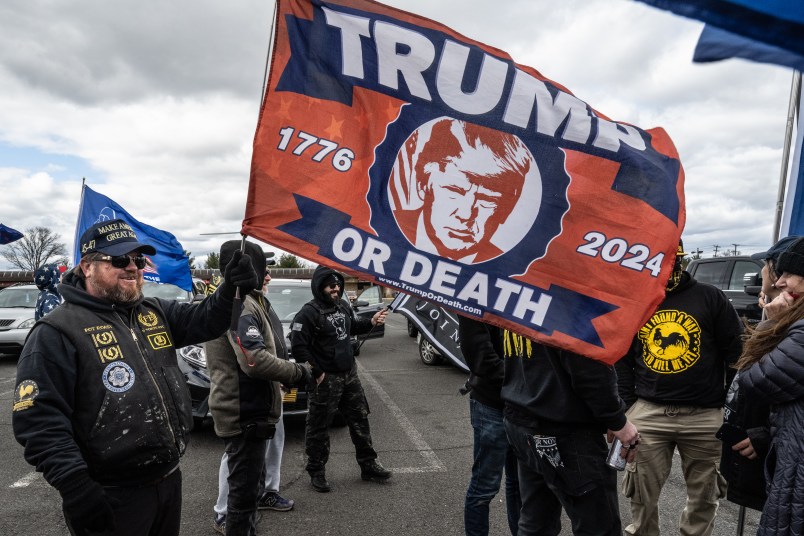This article is part of TPM Cafe, TPM’s home for opinion and news analysis. It was originally published at The Conversation.
When journalists sounded alarm bells in early May 2024 that more than 100 extremist militia groups had been organizing and communicating on Facebook, it wasn’t the first time militias had garnered attention for their online activities.
As a scholar of militias, I’ve seen extremists get kicked off Facebook before.
This time, the platform’s moderators took down roughly 100 pages and profiles for violating the social media network’s rules that prohibit “militarized social movements.”
These organizations include U.S. domestic militias, which are usually groups of armed people who meet regularly for shooting practice as well as discussions of cultural and political concerns. They also take personal responsibility for defending their communities and their country from a variety of perceived possible threats.
Some militias seek to defend themselves from the government, while others prepare to attack it — but all prioritize preserving Second Amendment rights and believe that they are protecting democracy from government tyranny that would otherwise be unchecked.
The 100 groups most recently removed are just a tiny fraction of the thousands of militia groups Facebook has previously kicked off the site, supposedly permanently. But it is nonetheless a concern that militias appear to be trying to reclaim the platform to network, recruit and publicize their activities.
Caught unprepared
In the months before the 2020 presidential election, Facebook blocked and removed the Facebook profiles and pages of about 10,000 militia groups and militia members. The company fully deleted the groups’ comments and interactions, including on topics that had nothing to do with militia activity.
For researchers like me, this was an eerie time. When I went on Facebook, it seemed as though those people and organizations had never existed. I’d studied them for decades, and they were just gone — even from the pages I created to monitor their activities.
Facebook had long been the primary place online where militias could chat with other militias, learning about their preferred tools and techniques, and, in some cases, plotting violent action. Most militia groups at the time had publicly accessible pages for their units and openly discussed many of their actions, though the most nefarious operated behind private or invite-only groups that researchers and law enforcement were not always able to access.
Militias like to think of themselves as being prepared for any eventuality, whether a natural disaster, a foreign government incursion or a more commonplace emergency like a car crash. But it became apparent that most of these groups had no meaningful backup plan for what they would do if they lost access to Facebook, the social media site where most of them were most active.
Some members tried to regroup on a variety of other platforms. But without a clear plan for doing so, they had trouble reconnecting with each other after Facebook shut their profiles down. This action, which scholars call “deplatforming,” was, in my view, the single most disruptive event in the militia movement’s history because of how dramatically and rapidly it disrupted the movement’s ability to coordinate across state lines.

A radicalization opportunity
Deplatforming can have downsides. People who are most aggrieved by perceived government actions or cultural conditions are those who are most motivated to find each other online. So Facebook was a collection point and meeting place for these people, increasing opportunities for individuals to become radicalized and potentially violent.
As they have been driven off Facebook and other platforms, many of them have moved to platforms that are more difficult for researchers and police to monitor for signals of emerging threats. That’s one downside.
In addition, the experience of being kicked off Facebook may have been a radicalizing moment for some. Some militia members I follow interpreted their deplatforming as further proof of their perceived oppression. Some of them argued that it was a violation of their First Amendment rights — though private companies are not bound by those legal standards.
My research has also found that many of these militia members never actually left Facebook. I personally observed them almost immediately creating new accounts. They seemed to be blocked from doing so only if they used the name or email address associated with their previous, deplatformed account.
With different names and email addresses to hide behind, these same people have remained active on Facebook since 2020. Most who evaded permanent deplatforming through such name modifications are not among those who were kicked off in the most recent purge. So far, they have chosen to remain under the radar rather than openly reclaiming a militia affiliation.
Comfort in public
Groups that have reclaimed a militia identity on Facebook appear to include groups previously kicked off, some of whom use their earlier unit names, and some of whom have rebranded, as well as new groups with people who had not publicly identified as militia members before the 2020 clear-out.
The fact that groups were openly operating with militia-related names on Facebook in 2024 means they are testing the platform’s moderation efforts. And it signals they are becoming more comfortable being visible, public entities.
That’s despite the increased public scrutiny that has followed criminal convictions of militia members for their involvement in the Jan. 6, 2021, insurrection and a militia plot in 2020 to kidnap Michigan’s governor.
These apparent militia efforts to reclaim Facebook as a semi-public platform mimic efforts by militias in places like Virginia to openly organize, recruit and participate in politics. Together, they serve as a reminder that militia members’ underlying concerns and beliefs have not disappeared in the past four years and are instead primed for potential calls to action as 2024’s electoral season continues.
During his term, President Donald Trump regularly appealed to fears that militia members share. His actions included both direct calls for the Proud Boys to “stand back and stand by” and more subtle but nevertheless derogatory references to immigrants, transgender people and other purported threats to American culture. Militia efforts to resurface into public view indicates that members feel both a legitimacy and an urgency for action as the 2024 election approaches.
While researchers like me are not currently expecting another large-scale event like the Capitol incursion, we are very much on edge regarding the possible coordination around state and local politics, especially those directly connected to the electoral process and outcomes.
This article is republished from The Conversation under a Creative Commons license. Read the original article.







Now describe the KKK.
“Members of the group gather in costume to express their shared enthusiasm for bonfires and the bonhomie of discourse on the topics of the day.”
No, you dipshit. They’re goddamned racists overtly bent on violent overthrow of modern multiracial society.
ETA: “As a scholar of Nazism, I have noted that Nazis are marksmanship enthusiasts and prize the timeliness of trains.”
About that guilty verdict…
I look at the faces of these Trump fans and I see a parade of people called dumb or ugly in high school and whose sense of personal power is underlined by their possession of a gun.
Not people to be feared. The Trump revolution will look like a number of Trump fans exercising monkey-like bigotries and will die in utero.
What are they mad at again - too convoluted. This isn’t the stuff that drives people to war; and when they look around, where do they see it in real life? Nowhere.
Give me a hundred like the guy standing on the left in the main picture, and I’ll take care of them myself. Welcome to Uncle Magic’s Real America Chipper Challenge.
Real tough guys don’t dress up. They aren’t that fat. They have no compelling reason to stand on a street corner.
The toughest this guy ever will be is standing in a quasi-uniform waving a flag.
Posting on Twitter?
Are Pravda and Russia Today no longer supporting him after his disastrous interview with Putin? (Rhetorical question. They will eventually. He is after all, a useful idiot.)
These are the idiots who still believe Fat Donnie’s bull jive without a shred of evidence. There certainly are a lot of them. But relatively small percent differences decide elections, and rational nontribal people are looking at the evidence and actions and turning off the GOP on many levels. I’m rooting for a Biden victory. And if it comes to riots and violence, I wouldn’t want to be on the militias’ team when shit gets real. See: A. Babbitt, et al.